Abstract
In the 1920s and 1930s when Korea was under Japanese colonial rule, the ideology of chastity was imposed on women to ensure its lineage. In contrast, men were free to divorce and restart their lives with their concubines. Without the right to custody of children or division of property, divorced women were stigmatized and forced into poverty. Na Hye-seok (1896–1948), a “new woman” and a pioneer, with a modern education, denounced this social injustice against women in her autobiography I-hon-go-baeg-jang 이혼 고백장 [Confession of Divorce] (1934), in which she recounted her personal experiences. The first Spanish translation of the chapter “Divorce” is presented here.
References
Hirose Reiko 히로세 레이코. 2006. “Il-bon-ui ´Sin-yeo-seong´gwa seo-yang-yeo-seong-hae-bang-sa-sang - Ellen Key sa-sang-ui su-yong-eul dul-leo-ssa-go” 일본의 ' 신여성'과 서양여성해방사상-엘렌 케이 사상의 수용을 둘러싸고 [La “mujer nueva” de Japón y las ideas de liberación de las mujeres occidentales: un análisis sobre la aceptación del pensamiento de Ellen Key]. 여성과 역사, núm. 5, 95-117. https://www.kci.go.kr/kciportal/ci/sereArticleSearch/ciSereArtiView.kci?sereArticleSearchBean.artiId=ART001231462
Hong Yang-Hee 홍양희. 2016. “‘Seon-lyang-han pung-sog’eul wi-ha-yeo: sig-min-ji si-gi ‘gan-tong-joe’wa seong (Sexuality) tong-je” “선량한 풍속”을 위하여: 식민지 시기 ‘간통죄’와 성 (Sexuality) 통제 [Por el bien de las “buenas costumbres”: el adulterio y el control de la sexualidad en la Corea colonial]. 법과 사회, núm. 51, 317-341. https://www.kci.go.kr/kciportal/ci/sereArticleSearch/ciSereArtiView.kci?sereArticleSearchBean.artiId=ART002106731
Im Sung-Won 임성원. “(Mil-mul sseol-mul) ‘na hol-lo taeg-si” [밀물 썰물] ‘나 홀로 택시’ [(Marea alta, marea baja) Taxi vacío]. 부산일보, 6 de septiembre de 2015, http://www.busan.com/view/busan/view.php?code=20150907000043
Jeong Geung-Sik 정긍식. 2013. “Han-gug-ui ga-gye-gye-seung-e-seo yeo-seong-ui ji-wi - sig-min-ji-gi yeo-seong-ho-ju-leul jung-sim-eu-lo” 한국의 가계계승에서 여성의 지위-식민지기 女性戶主를 중심으로 [La posición de las mujeres en la sucesión familiar en Corea: enfoque en el sistema familiar matriarcal en la Corea colonial]. 법사학연구, núm. 47, 7-50. https://doi.org/10.31778/lawhis..47.201304.7
Kim Eun-Shil 김은실. 2008. “Jo-seon-ui sig-min-ji ji-sig-in na-hye-seok-ui geun-daeseong-eul jil-mun-han-da” 조선의 식민지 지식인 나혜석의 근대성을 질문한다 [Se pregunta la modernidad de la intelectual coreana Na Hye-seok de la dinastía Joseon colonizada]. 한국여성학 24 (2): 147-186. https://www.kci.go.kr/kciportal/ci/sereArticleSearch/ciSereArtiView.kci?sereArticleSearchBean.artiId=ART001262476
Kim Kyung-Ai 김경애. 2013. “Na-hye-seog-ui yeo-seong-hae-bang-lon-ui sil-hyeon-gwa gal-deung” 나혜석의 여성해방론의 실현과 갈등 [Conflicto en la realización del pensamiento de Na Hae-seok sobre la liberación de las mujeres]. 여성과 역사, núm. 19, 263-297. https://doi.org/10.22511/women..19.201312.263
Kwon Hee-Jung 권희정. 2005. “Sig-min-ji si-dae han-gug ga-jog-ui byeon-hwa: 1920nyeon-dae i-hon-so-song-gwa i-hon-sa-lye-leul jung-sim-eu-lo” 식민지 시대 한 국 가족의 변화: 1920년대 이혼소송과 이혼사례를 중심으로 [Cambios en las familias coreanas durante el periodo colonial: centrados en los casos y los juicios de divorcio de la década de 1920]. 비교문화연구, 11 (2): 35-62. https://www.kci.go.kr/kciportal/ci/sereArticleSearch/ciSereArtiView.kci?sereArticleSearchBean.artiId=ART001151991
Lee, Haeng-Mi 이행미. 2021. “Yeo-seong-i ye-sog-doe-ji anh-eul sae-lo-un ga-jog-eul wi-han go-tu - na-hye-seog-ui ‘i-hon-go-baeg-jang’ (1934) eul jung-sim-eu-lo’ 여성 이 예속되지 않을 새로운 가족을 위한 고투 – 나혜석의 “이혼고백장” (1934) 을 중심으로 [Lucha por una nueva familia donde las mujeres no estén sometidas: enfoque en la “Declaración de divorcio” (1934) de Na Hye-seok]. 한국어와 문화, núm. 30, 179-209. https://kiss.kstudy.com/Detail/Ar?key=3898973
Lee Seong-Yim 이성임. 2008. “Jo-seon-si-dae yang-ban-ui chug-cheob-hyeon-sang-gwa gyeong-je-jeog bu-dam” 조선시대 兩班의 蓄妾現像과 經濟的 부담 [El concubinato de la clase yangban y su carga económica en la dinastía Joseon]. 古文書硏究, núm. 33, 319-345. https://doi.org/10.21027/manusc.2008.33..012
Na Hye-seok 나혜석. 1934. “I-hon-go-baeg-jang” 이혼(離婚) 고백장(告白狀) [Confesión de un divorcio]. 삼천리(三千里), 9 de agosto de 1934. https://gongu.copyright.or.kr/gongu/wrt/wrt/view.do?wrtSn=9029283&menuNo=200025
Park, Morgan Mok-Won. 2020a. “La otredad de las mujeres nuevas a principios del siglo xx: literatura y vida de Kim Il-yeop y Na Hye-seok”. En Documentando la memoria cultural: las mujeres en las (auto)narraciones exocanónicas, coordinado por Miriam Borham-Puyal, Jorge Diego Sánchez y María-Isabel García-Pérez, 155-170. Salamanca: Ediciones Universidad de Salamanca. https://dialnet.unirioja.es/servlet/articulo?codigo=7923987
Park, Morgan Mok-Won. 2020b. “Representación femenina del siglo XX en las viñetas de Hye-seok Na”. En Construcciones culturales y políticas del género, coordinado por Eva Hernández Martínez, José Manuel López-Agulló Pérez-Caballero y Sergio Marín Conejo, 519-537. Madrid: Dykinson. http://digital.casalini.it/4685446
So Hyunsoog 소현숙. 2011. “Gang-yo-doen ‘ja-yu-i-hon’, sig-min-ji si-gi i-hon-munje-wa ‘gu-yeo-seong’” 강요된 ‘자유이혼’, 식민지 시기 이혼문제와 ‘구여성’ [El “divorcio forzado”, el problema del divorcio y las “mujeres tradicionales” durante el periodo colonial en Corea]. 사학연구, núm. 104, 123-164. https://www.kci.go.kr/kciportal/ci/sereArticleSearch/ciSereArtiView.kci?sereArticleSearchBean.artiId=ART001615449
So Hyunsoog 소현숙. 2014. “Saeng-jon-gwa ja-jon-ui gil chaj-gi-1920~30nyeon-dae yeo-seong i-hon-gwa bin-gon-mun-je” 생존과 자존의 길 찾기-1920~30년대 여성 이혼과 빈곤문제 [Buscar una forma de superviviencia y autodignidad: el divorcio de las mujeres y la pobreza en la Corea colonial en los años 1920 y 1930]. 여성문 학연구, núm. 32, 75-113. https://www.kci.go.kr/kciportal/ci/sereArticleSearch/ciSereArtiView.kci?sereArticleSearchBean.artiId=ART001909816
So Hyunsoog 소현숙. 2020. “Geun-dae jeon-hwan-gi dong-a-si-a-e-seo i-hon-beob-ui byeon-hwa-han-jung-il bi-gyo” 근대 전환기 동아시아에서 이혼법의 변화-한 중일 비교 [Cambios en la ley de divorcio en el este de Asia durante la transición moderna: comparación entre Corea, China y Japón]. 역사와 담론, núm. 94, 117- 154. https://doi.org/10.22899/hosuh.94.202004.117
Song Myunghee 송명희. 2014. “Na-hye-seog-ui geub-jin-jeog pe-mi-ni-jeum-gwa gae-bang-gyeol-hon mo-ti-peu” 나혜석의 급진적 페미니즘과 개방결혼 모티프 [El feminismo radical y los motivos del matrimonio abierto de Na Hye-seok]. 인문 학연구 47 (1): 177-209. https://www.kci.go.kr/kciportal/ci/sereArticleSearch/ciSereArtiView.kci?sereArticleSearchBean.artiId=ART001861783
Yu Hyeonmi 유현미. 2017. “U-li-ga mal-ha-neun ‘gu-yeo-seong’i-lan eobs-da. ha-ji man geu-nyeo-deul-eun eo-tteon mal-ha-gi-leul ha-neun-ga?” 우리가 말하는 ‘구여 성’이란 없다. 하지만 그녀들은 어떤 말하기를 하는가? [No existen las mujeres tradicionales como las conocemos. Pero ¿qué dicen ellas?]. 사회와 역사(구 한국사 회사학회논문집) 115: 381-389. https://doi.org/10.37743/SAH.115.10
This work is licensed under a Creative Commons Attribution-NonCommercial-NoDerivatives 4.0 International License
Copyright 2022 Estudios de Asia y África



